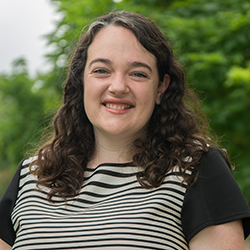 By Ashton Wells
By Ashton Wells
2016 BJC Fellow
I feel very privileged to be a part of the Baptist Joint Committee Fellows Program. The week we spent in Colonial Williamsburg was informative, inspiring, and encouraging. Each element of the program helped form my understanding of religious liberty a little more. Growing up Baptist, the term “religious liberty” was thrown around a lot, but I never really knew what it meant. For example, before this weekend I did not even realize that there was an Establishment Clause and a Free Exercise Clause in the First Amendment. After the week in Virginia, I have the historical knowledge of the importance of religious liberty to the foundation of our country and the modern implications of what religious liberty truly means. I am so grateful to now have the knowledge AND the resources to share this knowledge with others.
Friday was an interesting day, as we heard from a Thomas Jefferson interpreter, as well as Dr. Michael Meyerson, Brent Walker, and Jennifer Hawks. We went from learning about the history of the First Amendment to the current definition of religious liberty and how it plays out in the legal world. One of the main take-aways I had from the program as a whole came from the ideas of Dr. Meyerson and Thomas Jefferson. The Thomas Jefferson interpreter talked about the laws that were forming as he was president, saying “law is living and breathing from on generation to the next.” When Dr. Meyerson was describing early religious liberty in the colonies, he talked about how there are no final victories when it comes to religious liberty. Just because something is written into law does not mean it continues to be interpreted in the same way. The combination of Jefferson and Meyerson led me to the conclusion that religious liberty is just as important today as it was 200 years ago, because law is fluid and is alive. And because law is fluid, it is important that people understand what religious liberty truly means so they can advocate for continued separation of church and state. Jennifer Hawks really brought this idea to light when she was going over the many court cases that the Baptist Joint Committee was following and/or had contributed to. Their advocacy is important because human beings are dynamic and so are the laws that govern our democracy and society. Brent Walker outlined this as he talked about the difficulty there can be in outlining the boundaries between government and religion. It is not that religion does not influence the people who make up our government, but the separation of church and state needs to be advocated for the sake of religious liberty.
During this experience, I was also reintroduced to my belief that relationships are pivotal to making the world go round. One of the questions that kept being asked by different fellows was “how do I share this information with _____?” How do I share this information with those in different denominations? In more conservative/liberal denominations? Those who have a completely different faith? We are unsure of how to reach out to those who are different than us. We debated several different approaches, but I think it all boils down to relationships. People are more likely to listen to people that they trust. They are more likely to consider new ideas when they are presented in a safe space by someone they know. I saw that in just the few days of the Fellows Program. In the beginning, all of our questions to each other centered around basic get-to-know-you questions, none of us really being inquisitive into the thoughts of the other. But by the end of our time together, after we had worked to build relationship with one another, we were able to debate questions in a safe space, and people were more willing to respectfully voice their disagreements. We can grow so much more and achieve so much more if we are willing to reach out respectfully to those who are different than us.
I am so thankful for the experience in Williamsburg and am excited because I know that it is just the beginning of a journey of advocating for religious liberty in my community and with the other fellows. It is exciting to know that I have a group of people to call on when I see religious liberty threatened in my own community. I am excited to begin to invest more in my local government and advocacy efforts, hoping to bring my knowledge of religious liberty to my local context. And I am excited to work within my church context and broader church network to share what I have learned over the next year. I cannot thank the Baptist Joint Committee enough for deciding to invest in me and my future and to help mold me into a better religious liberty advocate.
Read other reflections from BJC Fellows and visit BJConline.org/Fellows for more on the program.




